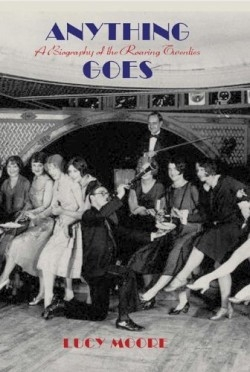Anything Goes
A Biography of the Roaring Twenties
Crime and rebellion characterized life for many of the downtrodden in the 1920s’ US, while the elite lived high on booze and luxury. Known as the Jazz Age, this fascinating post-war era of Prohibition and flappers, frivolity and instant gratification, has mesmerized historians throughout the world.
After the devastating events of World War I, a traumatized public encountered a supercharged economy that turned out more goods than could be consumed. Struggling citizens wondered where they fit in, while wealthy, class-conscious entrepreneurs enjoyed their glory days. A prolific interlude of artistic achievement in film, literature, and music, the Roaring Twenties is perhaps the most important decade of the American twentieth century.
Lucy Moore’s enlightening, well-researched biography of the 1920s will appeal to scholars as well as a general audience. Filled with attention-grabbing details that many historians neglect and a wide range of subjects—from celebrities like Charlie Chaplin and Bessie Smith to political corruption and social upheaval—Anything Goes will not disappoint readers, no matter their educational background.
Much of Moore’s success lies in her selection of topics—and the 1920s gives her plenty to choose from: organized crime, racial unrest, an emerging Hollywood, and thriving industry. This interdisciplinary study encompasses advances in aviation, free-wheeling feminism, pervading xenophobia, and consequential changes in publishing. The controversial trials of anarchists Sacco and Vanzetti, the frightening schemes of the Ku Klux Klan, and the difficult birth of The New Yorker magazine—all these period markers combine to give the reader a well-rounded impression of 1920s’ America.
Educated in Britain and the US, Moore lives in London and was voted one of the “Top Twenty Young Writers in Britain” by The Independent on Sunday. Known as a “mainstream” historian, the author has released two other titles, including the bestseller Maharanis: The Lives & Times of Three Generations of Indian Princesses.
Along with the seduction and glamour associated with the 1920s, Moore has presented an “epoch of passion and change” that she compares to our own age. Anyone interested in discovering Al Capone, F. Scott Fitzgerald, and Charles Lindbergh in the pages of the same book will find this broad-based work a worthwhile pursuit.
Reviewed by
Julia Ann Charpentier
Disclosure: This article is not an endorsement, but a review. The publisher of this book provided free copies of the book to have their book reviewed by a professional reviewer. No fee was paid by the publisher for this review. Foreword Reviews only recommends books that we love. Foreword Magazine, Inc. is disclosing this in accordance with the Federal Trade Commission’s 16 CFR, Part 255.

